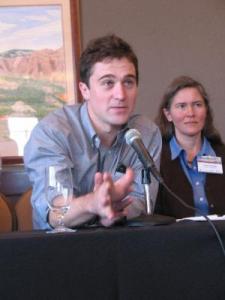By Amy Mayer
When Siri Carpenter opened the Pitch Slam session, just two writers had signed up to pitch. But an hour and a half later, nearly a dozen ideas had been put to the panel of seven editors. Not a single assignment was made — who would expect that, anyway? — but both the pitchers and many others in the room likely walked out with insight about how these editors think and some specific suggestions for selling an idea.
Tyghe Trimble from Men’s Journal, for example, encouraged writers to prod him — six follow-up emails won’t bother him. Michelle Nijhuis, a contributing editor at High Country News, said specifically that she’s open to working with new writers. Drawing upon suggestions made on individual stories, a few pointers stand out. Catch an editor’s attention with something sexy — “cowboy” was a hit, as was “scientific detective story”. Describe the character through whom you’re going to tell the story and convince the editor that this person will be a solid source. Scientific American online news editor Robin Lloyd posed some probing questions to the pitchers. Afterward she said that if a writer can’t answer her questions immediately it doesn’t mean she won’t assign the story.“It’s okay to have a conversation,” she said. “In fact, it’s preferred.”
The other publications represented were Outside, Smithsonian, Nature and Mother Jones. Each editor gave suggestions about what their magazines would need for an idea to work. For example, a pitch about the history of protest movements prompted Laura Helmuth from Smithsonian to outline how her magazine might approach such a story—by finding a little-known but not too obscure example of a protest from American history that could serve as an entrée into the topic. Mother Jones editor Michael Mechanic, on the other hand, said the subject might be covered in a timeline as part of a larger package. But he cautioned of the potential for timelines to bore readers.
“You gotta make it fun,” he said.
Some of the pitching writers clearly had prepared story ideas they wanted to sell, while others got up on a whim. Either way, though, the editors responded respectfully and, it seemed, helpfully. One takeaway, therefore, is that even if you find yourself in such a session unprepared to pitch, you shouldn’t shy away from the opportunity. Jennifer Bails didn’t. The Pittsburgh-based writer got up and outlined the concept of Israeli soldiers banking sperm so if they were killed in combat their parents would have the option of orchestrating grandchildren. Trimble said he loved the idea. Bails says she’s not sure the story will ever make it into Men’s Journal or any of the other magazines on the panel, but the experience has encouraged her to push herself into new markets.
“From this session, I think I would be less afraid about reaching out to bigger magazines,” she said.

